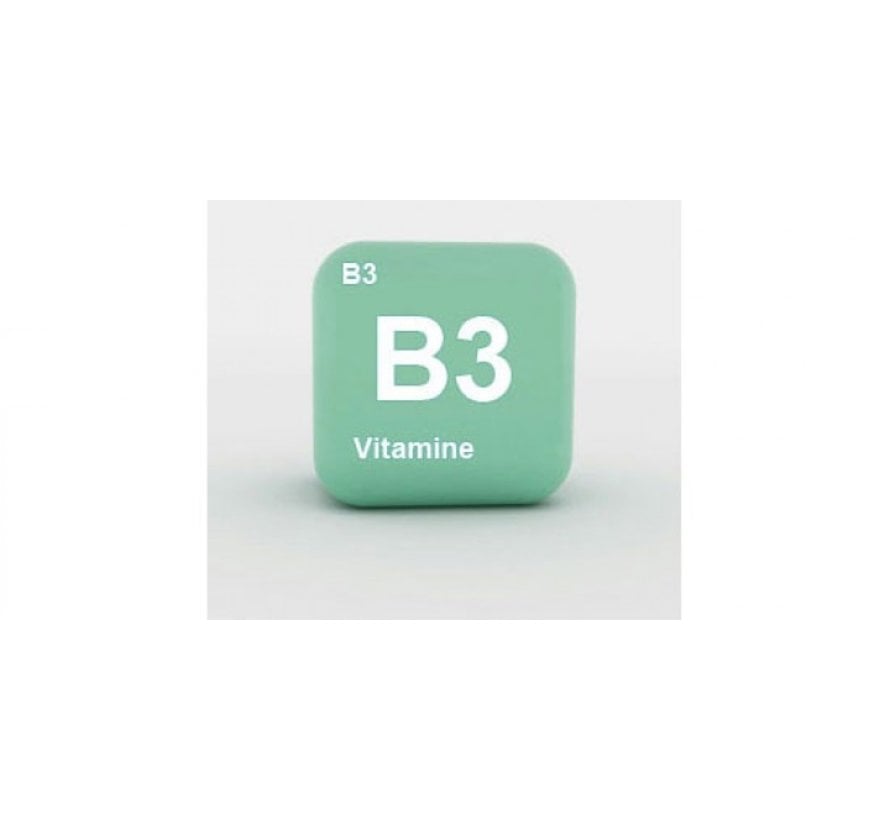Vitamin B3 Niacin
Vitamin B3 Niacin (nicotinic acid/nicotinamide) (serum code NICOAM)
Vitamin B3 is part of the vitamin B complex. It used to be thought that there was only one vitamin B. Later, vitamin B was found to consist of several separate vitamins. B vitamins are water-soluble vitamins. Vitamin B3 plays an important role in cellular energy supply and nervous system function. It is also important for healthy skin.
Vitamin B3 is found in various foods: meat and fish, poultry, nuts, seeds and grain products. In addition, the body can make vitamin B3 in part from the amino acid tryptophan (building block of protein). As a result, protein-rich products such as dairy and eggs also contribute to the production of niacin (via the conversion of tryptophan).
The Health Council has set the recommended daily allowance of vitamin B3 for adult men at 17 milligrams and for women at 13 milligrams.
Vitamin B3 occurs in two forms: nicotinic acid and nicotinamide. No adverse effects are known from the use of large amounts of nicotinamide. This form is generally used in supplements and fortified foods. Nicotinic acid, which may also be used for this purpose, may cause blood vessel dilation in the skin (flushing). This has no serious consequences. The upper limit for nicotiamide is set at 900 mg. The upper limit for nicotinic acid is set at 10 mg per day.
Vitamin B3 deficiency is not common, as a high-protein diet already provides sufficient vitamin B3. Deficiency can cause changes in the skin such as rashes and inflammation. In addition, fatigue symptoms can occur. There are also effects on the lining of the mouth, tongue and intestines. These symptoms are referred to as "pellagra," which literally means "rough skin. In very severe cases, pellagra leads to disorders of consciousness or dementia.
This vitamin is rarely mentioned. As a result, little attention is paid to it. Some laboratories do not even want to do the determination of this drug because they consider it unimportant. The reason is that mainstream doctors and specialists are also not familiar with it and therefore do not make these determinations. This is for the benefit of the pharmaceutical industry, which then gives drugs to suppress the symptoms, which are a result of vitamin B3 deficiency.
A deficiency or lack of vitamin B3 causes many syndromes in which one often sees no connection with the following syndromes:
- Pellagra
- Schizophrenia
- Pyroluria
- Cardiovascular diseases
- Huntington's disease
- Parkinson's disease
- Arthritis and other joint disorders
- Dementia
- Alzheimer's disease
- Cancer
- Addictions to alcohol and smoking
- Dysmenorrhea
Slight deficiencies and cause the following conditions:
- Skin rash with infection, dermatitis, scaly nostrils
- Dark pigmentation with inflammation or irritation
- Sensitivity to sunlight
- Red tongue, anorexia and nausea.
- Inflamed dental mucosa.
- Diarrhoea, indigestion, smelly breath
- Emotionally unstable with tendency to depression
- Fatigue with insomnia
- Headaches and forgetfulness up to dementia
- Muscle weakness with painful limbs
- Cold hands and feet
Pellagra is a vitamin deficiency disease, usually associated with a chronic combined deficiency of nicotinic acid (vitamin B3) and the and essential amino acid and tryptophan.
Deficiency of vitamin B3 does not occur easily because the body can make this vitamin itself from the amino acid and tryptophan. However, in chronic and alcoholism, one may be deficient in this vitamin. Bacterial overgrowth in the small intestine and the use of certain medications can also cause pellagra. In Europe and North America, pellagra is rare except in special cases such as alcoholism. In and developing countries, this disease is frequent and is the most frequent nutritional deficiency in adults.
Traditionally, pellagra has been described with the "four Ds": diarrhea, dermatitis, dementia, and death.
More specifically described are the following and symptoms and possible:
- Diarrhoea with blood
- Flaky skin conditions (photosensitive dermatitis)
- Headache
- Skin fissures
- Oral mucositis
- Sore red lips
- Swelling of the parotid gland (salivary gland)
- Reduced appetite
- Disorders of the nervous system with sensory and visual disturbances and dementia.





